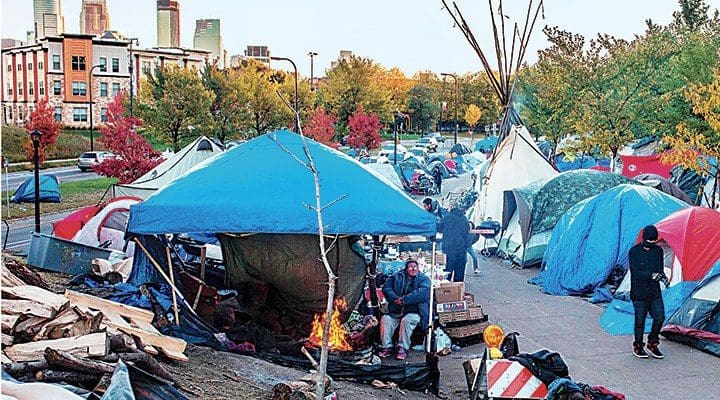By Neli Vazquez-Rowland*
Our Human Infrastructure is Broken Too, We Must Seize the Opportunity to Fix That Now
Even before the pandemic, the growing opioid and the homeless epidemics were becoming visible to all of us living in major cities across America. While you may now think it is normal to see homeless people and families with children living in homeless encampments with tents popping up everywhere in many big, cold weather cities like Chicago, it is anything but normal and strips people of their dignity. If Chicago truly is the city of big shoulders, we should try to lift up everyone in need on those shoulders, to ensure they have a warm, safe place to spend the night, instead of letting this seemingly irretractable humanitarian crisis continue.
Growing up in Chicago in Little Village, in one of the poorest communities in the city, the idea of people living in inhumane, unsafe conditions, akin to a third world country, seemed unfathomable. Yet it is happening right before our own eyes, it is already getting worse, and the realities of the pandemic may make this societal scar even more pronounced. While we are members of a society always in a race to get somewhere, we cannot forget we are members of the human race, and can no longer neglect our responsibility to get involved to stop this scourge.
I can only imagine the sense of urgency we would act with if we closed our eyes and imagined these faceless humans living on the streets as our own brothers, sisters,  mothers, fathers and children. By now we all know someone who’s loved one or friend has been impacted by the opioid and homeless epidemic and today we watch those same families painfully endure the feeling of loss and helplessness in their efforts to save them. Sadly, they will continue to feel that way and more will join them, without the focused, intentional, and widespread support of the public.
mothers, fathers and children. By now we all know someone who’s loved one or friend has been impacted by the opioid and homeless epidemic and today we watch those same families painfully endure the feeling of loss and helplessness in their efforts to save them. Sadly, they will continue to feel that way and more will join them, without the focused, intentional, and widespread support of the public.
Prior to the pandemic, over 40% of Americans were already living paycheck to paycheck. These hardships, now magnified by the pandemic, are causing the mental health crisis to rise and opioid epidemic to break a record of over 100,000 deaths this year, leading to a higher number of people facing the prospect of homelessness.
Despite the federal extended rent moratorium and unemployment benefits, we are seeing an increase of unsheltered homelessness by 21% and chronic homelessness by 34% in Illinois, that’s according to the 2021 National Alliance to End Homelessness report . This increase is happening at a time when the number of homeless bed capacity has been reduced by almost 70% due to CDC requirements to achieve proper social distancing, a situation that will only lead to more unsheltered homeless people in the future.
Let’s take a moment to consider and focus on what steps we can take to not only respond to the immediate needs of hunger and housing, but to actually invest in a long-lasting solution that prevents, addresses, and ends homelessness with a framework that provides the behavioral, economic, and housing health infrastructure that we need to permanently and positively change the trajectory of this growing nightmare.
The first step is we must believe that ending homelessness is a worthwhile- we did not get here overnight. To achieve the result we need, we must all agree that it is crucial to prioritize this humanitarian crisis, and thanks to the opportunity to allocate resources from the American Rescue Plan and our ability to leverage public-private partnership support, fixing it is realistically within our reach for the first time ever.
The second step is urging government policymakers, corporate philanthropists, and individual influential donors to make smart, pragmatic decisions based on proof of concepts, free of political ideology and favoritism. Now is the time to use our voice, resources and platforms to advocate for the most vulnerable people in our society.
The third step, we must do our research. Not all homeless organizations are alike. While there are many types of approaches, we should find and support those that align with your values and work the best at solving the root causes of homelessness and getting them back on the right track with jobs and housing, so that they may live in the most humane and dignified manner.
While we are celebrating the passage of the largest transportation infrastructure bill in our nation, to fix our broken roads and bridges to get people where they need to go, I hope that we also pause to consider how we can utilize the ARPA funds to help lift up and amplify and achieve the most compassionate, accountable and successful human, economic, and housing infrastructure in the world, too. We have the urgency and the funds to actually challenge the entrenched and broken systems, and replace them with the most holistic and proven public-private partnership approaches that we have in Illinois and across the nation. The return on our investment will be measured in the lives that we will save, the workforce we will unleash, and the tax base we will expand, which will be our legacy for the next generation. I hope you will make this a priority and join me on this important journey to help heal some of our most vulnerable friends and family members.
*Neli Vazquez Rowland is Co-Founder A Safe Haven Foundation, Social Entrepreneur, Affordable Housing Real Estate Developer Author of HEALING.
Contact: Media@asafehaven.org – Tel: 7734358355











